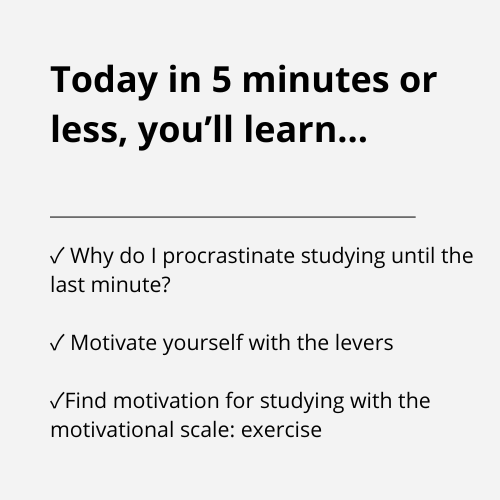- Verve Newsletter
- Posts
- Why do I study at the last minute?
Why do I study at the last minute?
How to motivate yourself in time and avoid procrastination
Hello Enthusiastic of Knowledge!
Happy Easter!🐣
I hope you enjoyed your Easter break! Now it's time to get back to work, and I know, you're lacking motivation...
Luckily, you've stumbled upon this email!
Today, we'll discuss motivational triggers, particularly those related to pleasure and pain, and how to leverage them to boost our motivation when we're not feeling like studying.

Have you ever found yourself unable to be motivated to study until the last moment before the exam?
Here you will understand why this happens, and how to leverage the same principle to motivate yourself to study on time.

Why do I procrastinate studying until the last minute?
All our actions and decisions are guided by motivation, which primarily stems from two forces: the pursuit of pleasure and the avoidance of pain. Even though the context has changed over time, our basic mechanism remains the same, still founded on these two forces.
Between the two, the lever of pain is often the most powerful. People tend to do more to avoid immediate pain than to seek future pleasure. However, there's an issue with this lever: it only works in the short term. If the anticipated pain is too far in the future, it might not be motivating enough to push us into action, especially if we're currently immersed in pleasure.
Have you ever procrastinated studying until just a few days or hours before the exam?
Last-minute studying is a common example of this phenomenon. We postpone studying until just a few days or even hours before the exam because the pleasure of relaxing outweighs the future pain of receiving a bad grade.
Only when the exam becomes imminent and the pain becomes immediate do we feel compelled to study.
The trick lies in balancing these two forces: making future pain more tangible and immediate, and making the pleasure of studying more appealing.
Here are two ways to effectively utilize levers in studying:
Motivate yourself with the levers
We can't always rely on exams as the sole driver of our motivation to study. Our goal should be to cultivate a love for learning as a tool for growth beyond the classroom setting. Studying is a lifelong skill, and we won't always have an imminent exam to push us forward.
Often, when it comes to studying, the results aren't immediately visible, so they aren't motivating enough. Therefore, it's essential to focus on triggering intrinsic motivation in the learning PROCESS, separating the pleasure derived from the act of studying from the results we achieve.
Here's how to leverage our levers:
Pleasure lever:
To leverage the pleasure lever effectively, the most efficient way is to make the studying process as enjoyable as possible.
You can make it enjoyable by associating pleasurable activities with studying. For example, listen to your favorite music while studying or reward yourself with a treat after completing a study session.
The more we make our study sessions enjoyable and rewarding, the more motivated we will be to continue studying. Associating pleasure with studying makes learning a positive and stimulating experience, thereby increasing our motivation and commitment to the learning process."
Pain lever:
To motivate ourselves, we can also leverage the pain lever. By attaching immediate pain to undesirable habits we want to change, we will be motivated to change them.
For example, Create a Consequence for Procrastination:
Introduce negative consequences for procrastination to associate pain with not studying. This could involve setting a consequence for yourself if you don't meet your study goals, such as giving up a leisure activity or facing additional study time
Find motivation for studying with the motivational scale
The technique of motivational balancing is a tool that facilitates this process of self-motivation. The principle it is based on is that pleasure and pain often represent a wholly subjective idea in the modern world (our personal perception of the situation).
This can be conditioned through a series of questions capable of changing our perception of reality.
Here's a guide on how to use motivational balancing to overcome procrastination and motivate yourself:
1. Describe a situation that you should address but continue to postpone:
___________________________________
2. Imagine an old-fashioned balance scale with the classic two plates for weighing. On the left is the plate of pain representing all the reasons why you haven't yet addressed the situation, on the right is the plate of pleasure.
3. Start filling the plate of pleasure by indicating all the opportunities and benefits you would gain by addressing the situation:
___________________________________
4. Imagine that everything has gone exactly as you hoped. How do you see yourself? How do you feel? What have you achieved? Try to visualize yourself in this new context, what emotions do you feel?
Add all these pleasant feelings to the plate of pleasure:
___________________________________
5. For our minds, avoiding pain is the first and most important form of pleasure. What could happen if you don't address the situation?
Add to the plate of pleasure all the potential dangers you will avoid by taking control of the situation:
___________________________________
Learning to use our motivation to improve our relationship with studying is essential.
Did you find this exercise helpful?
Reply to this email and let me know how you used them!
Have a great week!😘
Isa